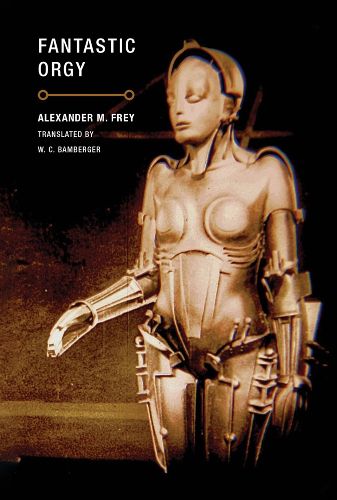Readings Newsletter
Become a Readings Member to make your shopping experience even easier.
Sign in or sign up for free!
You’re not far away from qualifying for FREE standard shipping within Australia
You’ve qualified for FREE standard shipping within Australia
The cart is loading…






Maimed beggars, female automatons, cultural prosthetics: four tales of opulence, poverty and grotesque empathy from the Weimar Republic
First published in 1924, Fantastic Orgy is most notable for its title story, an account of a drinking rout organized for maimed beggars in honor of a sideshow attraction, a mechanical woman doomed to early death through disintegration from entertaining the masses-a depiction of a robotic woman preceding by several years Fritz Lang's less sympathetic presentation in Metropolis. All four stories, however, explore the emotional and material needs of a crippled society, the economic trap of poverty and the hypocritical righteousness of charity. Like an etching by Georg Grosz or Otto Dix translated into literary form, Alexander Frey presents the troubling, at times fantastical notion of a prosthetic humanity for damaged times. Alexander M. Frey (1881-1957) was a German author whose antiwar novel Die Pflasterkaesten (The Cross Bearers) is considered by some critics to be superior to All Quiet on the Western Front. Frey refused to join the National Socialist Party, despite having served as a medic in the trenches of World War I alongside dispatcher Adolf Hitler, and fled Germany during World War II.
$9.00 standard shipping within Australia
FREE standard shipping within Australia for orders over $100.00
Express & International shipping calculated at checkout
Maimed beggars, female automatons, cultural prosthetics: four tales of opulence, poverty and grotesque empathy from the Weimar Republic
First published in 1924, Fantastic Orgy is most notable for its title story, an account of a drinking rout organized for maimed beggars in honor of a sideshow attraction, a mechanical woman doomed to early death through disintegration from entertaining the masses-a depiction of a robotic woman preceding by several years Fritz Lang's less sympathetic presentation in Metropolis. All four stories, however, explore the emotional and material needs of a crippled society, the economic trap of poverty and the hypocritical righteousness of charity. Like an etching by Georg Grosz or Otto Dix translated into literary form, Alexander Frey presents the troubling, at times fantastical notion of a prosthetic humanity for damaged times. Alexander M. Frey (1881-1957) was a German author whose antiwar novel Die Pflasterkaesten (The Cross Bearers) is considered by some critics to be superior to All Quiet on the Western Front. Frey refused to join the National Socialist Party, despite having served as a medic in the trenches of World War I alongside dispatcher Adolf Hitler, and fled Germany during World War II.